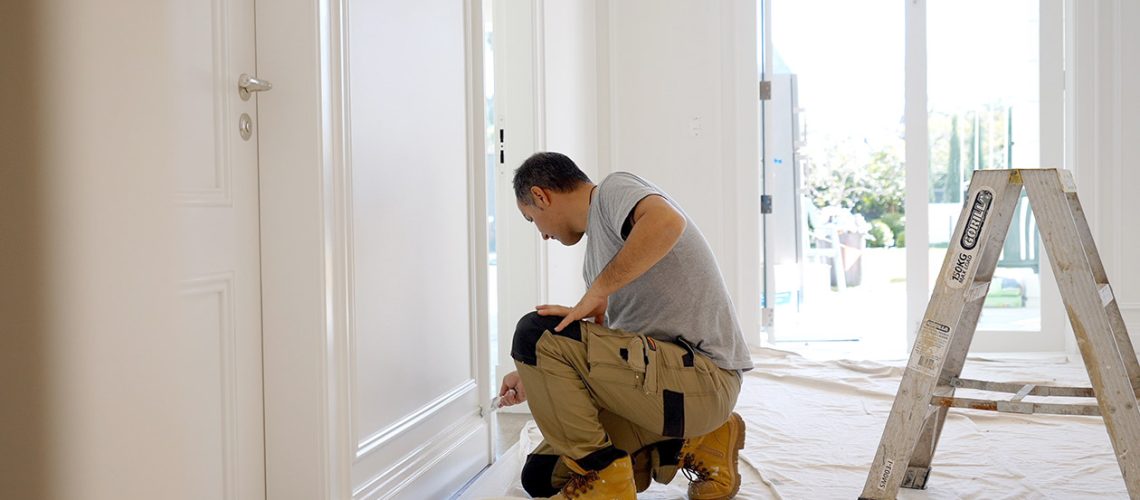While both commercial and residential painting aim to enhance spaces, they cater to vastly different needs and demands. Understanding these distinctions is crucial for choosing the right service for your project, whether revitalising an office building or creating a welcoming home environment. Read on to see our breakdown of commercial painting vs residential painting services.
Understanding the Core Differences
At their heart, commercial and residential painting differ in scale, intended use, and regulatory requirements. Here’s a detailed look at each aspect:
1. Scale and Complexity of Projects:
- Commercial: Commercial painting projects are typically large-scale, encompassing entire buildings, offices, retail spaces, or industrial facilities. They involve multiple surfaces, high ceilings, and complex layouts, often requiring specialised access equipment.
- Residential: Residential projects focus on individual homes, apartments, or smaller units. They involve a smaller scope, often encompassing individual rooms, interior walls, or exterior surfaces.
2. Types of Paint and Materials Used:
- Commercial: Commercial projects demand durable, long-lasting finishes, often with high-performance paints and coatings designed for high-traffic areas, heavy wear, and specific industry standards. This can include:
- Epoxy coatings: Offer exceptional durability and resistance to chemicals and abrasion, ideal for floors and high-wear areas.
- High-performance paints: Formulated for resistance to moisture, UV rays, and extreme temperatures, suitable for exterior surfaces or industrial settings.
- Fire-retardant paints: Meet fire safety codes and are crucial for buildings with specific safety requirements.
- Residential: Residential painting prioritises aesthetics, personal preferences, and achieving specific finishes. This allows for a broader range of materials, including:
- Decorative paints: Offer unique textures, finishes, and effects to enhance the visual appeal of interiors.
- Eco-friendly paints: Contain low VOCs (Volatile Organic Compounds) and are healthier for indoor environments.
- Colour palettes: Offer various colours and finishes tailored to individual tastes and design preferences.
3. Project Timelines and Scheduling Needs:
- Commercial: Commercial projects often have tight deadlines due to operational requirements, demanding efficient scheduling and prompt completion. This often involves working around business hours, coordinating with other trades, and adhering to strict timelines.
- Residential: Residential projects offer more flexibility in scheduling, allowing homeowners to work around their own schedules and lifestyle.
4. Licensing, Insurance and Safety Requirements:
- Commercial: To operate legally, commercial painters must adhere to strict licensing and insurance requirements. They must also meet specific safety regulations, such as those outlined by OSHA (Occupational Safety and Health Administration), to ensure worker safety during large-scale projects.
- Residential: While residential painters may have less stringent licensing requirements, they are still expected to maintain basic insurance coverage and adhere to local safety standards.
5. Customisation and Aesthetic Considerations:
- Commercial: Commercial projects often prioritise practicality and functionality over aesthetics. However, certain commercial spaces may require specific colour schemes or branding elements.
- Residential: Residential projects emphasise personalisation and aesthetic preferences. Homeowners can choose various colours, finishes, and decorative techniques to create a desired look and feel.
6. Frequency and Maintenance:
- Commercial: Commercial buildings often require regular repainting due to high traffic, wear and tear, and potential damage.
- Residential: Residential painting is typically done less frequently, depending on factors like weather conditions, exposure to elements, and individual preferences.
7. Legal and Regulatory Compliance:
- Commercial: Commercial painting projects must comply with local building codes, fire safety regulations, and potentially, specific industry standards.
- Residential: Residential projects typically have less stringent regulations, but basic safety standards and local building codes still apply.
8. Environmental and Health Impact:
- Both: Both commercial and residential painting projects should prioritize using eco-friendly paints with low VOCs to minimise their environmental and health impact. Proper disposal of paint waste is also essential. Within New South Wales, you can take your paint to the ‘PaintBack’ program or a recycler like Cleanaway.
Choosing the Right Painting Service
Making the right choice depends on a combination of factors:
- Project Scale & Scope: Large-scale projects with complex layouts, multiple surfaces, or high-traffic areas generally require commercial painting services. Smaller projects within homes or individual units are typically handled by residential painters.
- Budget: Factor in the scale of your project and the potential costs associated with specific materials and labour required. Commercial painting services can be significantly more expensive due to specialized materials and stringent regulations.
- Timeframe: Commercial projects often have tight deadlines due to operational requirements, demanding efficient scheduling and prompt completion. Residential projects offer more flexibility and are generally completed within shorter timeframes.
- Specific Needs & Preferences: Do you require specific coatings, fire-retardant paints, or high-traffic finishes? Commercial painting services often cater to these specialised needs, whereas residential painting offers a broader range of aesthetic options and decorative finishes.
Is Commercial Painting more expensive than Residential painting?
Yes, commercial painting in Sydney is generally more expensive than residential painting. This is due to several factors:
- Scale and Complexity: Commercial projects are typically larger and more complex, involving multiple surfaces, high ceilings, and often requiring specialized access equipment. This translates to more labour hours and potentially higher material costs.
- Specialised Materials: Commercial projects often demand durable, high-performance paints and coatings designed for high-traffic areas, heavy wear, and specific industry standards. These specialised materials are usually more expensive than standard residential paints.
- Stricter Regulations: Commercial painting in Sydney must comply with stricter building codes, fire safety regulations, and potentially, specific industry standards. This can involve additional inspections, permits, and safety protocols, adding to the overall cost.
- Scheduling and Time Constraints: Commercial projects often have tight deadlines and require coordination with other trades, potentially increasing labour costs and impacting project timelines.
While there can be exceptions, it’s safe to say that you’ll generally find commercial painting projects in Sydney to be more expensive than residential ones.
Real-world Examples
- Office Building Renovation: This is a clear example of a commercial painting project. It demands durability, compliance with safety regulations, and potentially fire-retardant paints.
- School Classroom Renovation: This project also requires durable finishes, specific safety standards, and adherence to building codes, making it a commercial painting job.
- Home Interior Repaint: This falls under the category of residential painting. It involves individual rooms, personal preference in colour selection, and a focus on creating a visually appealing space.
- Home Exterior Repaint: This is also typically handled by residential painters, as it involves smaller surfaces and can be tailored to individual preferences.
Additional Considerations
- Licensing & Insurance: Verify that your chosen painter holds the necessary licenses and insurance for their type of work. This protects both you and the painter from liability.
- Warranties & Guarantees: Explore the warranties and guarantees offered by the painter. These provide assurance about the quality of work and protection against potential issues.
Choosing the right painting service requires carefully considering your needs, project scale, budget, and timeframe. By understanding the differences between commercial and residential painting services, you can make an informed decision that leads to a successful and satisfying project.
For professional painting services, contact us today! We offer both commercial and residential options to meet your unique needs.

